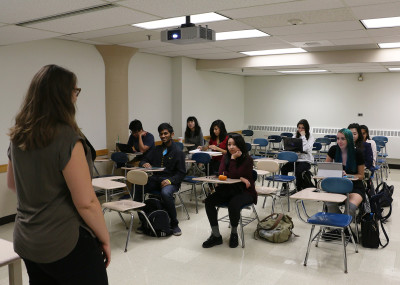
Despite several universities across the country forgoing the use of trigger warnings on campus, Boston University holds no official stance of ordinance governing the use of trigger warnings in academic settings.
Administrators at both American University and Cornell University have spoken out against trigger warnings, with American citing freedom of speech as its defense.
“The Faculty Senate does not endorse offering ‘trigger warnings’ or otherwise labeling controversial material in such a way that students construe it as an option to ‘opt out’ of engaging with texts or concepts, or otherwise not participating in intellectual inquiries,” the AU Faculty Senate wrote in a statement. “… the Faculty Senate affirms that shielding students from controversial material will deter them from becoming critical thinkers and responsible citizens.”
However, BU’s view on trigger warnings is far more subjective. BU spokesman Colin Riley said this issue should be addressed in a course syllabus if a faculty member decides to do so on their own.
“BU is comprised of 17 schools and colleges and individual faculty members set the course framework, policies and expectations for their classes,” Riley said in an email.
Though BU’s Faculty Handbook does not explicitly address trigger warnings, it upholds the principle of freedom of speech while still allowing professors to independently decide a class’s stance on trigger warnings.
“Academic freedom is essential in institutions of higher education if they are to make their proper contribution to the common good,” the handbook reads. “The common good depends upon the free search for truth and its free exposition. It is that which justifies academic freedom, not the interest of the individual faculty member or even the interest of a particular university.”
Trigger warnings are not designed to take away from sensitive conversation, but rather to invite it, BU Student Government’s Vice President of Internal Affairs Marwa Sayed said.
“It seems trigger warnings have been misrepresented as a mechanism by which to censor content or to block out a conversation,” she said, “but usually the conversation is about sexual assault, an issue on our campus, so of course we’re going to have a conversation about that, but to make people who might be affected by that topic aware that the topic may be discussed, so they can prepare themselves mentally, physically, in whatever way they need to.”
Sayed also said that while there is no official policy currently in the works with the SG Executive Board, she would not be surprised if there are conversations about trigger warnings fairly soon.
“There are, of course, concerns from students themselves who talk about this issue a lot,” Sayed said. “I’ve been in certain classes that have had trigger warnings before, but that’s class-specific and at the professor’s discretion, not a BU policy.”
Autumn McArthur, a member of the Center for Gender, Sexuality & Activism, agreed that trigger warnings can be beneficial in a university setting when their purpose is properly clarified.
“I think they’re an asset,” they said. “I have seen them fail, and I have seen them not be present at all, and I’ve seen them work really well. I think when they’re properly explained, and people really understand what the purpose is, everyone that I’m around at least sees the value in them and wants them to be implemented.”
McArthur is majoring in sociology, which covers a large amount of sensitive subject material within the classroom, they said. They argued that the only way students can feel comfortable in a discussion-based class is if they can be themselves.
“As a student, you are bringing your entire identity into the classroom, and I think that academia needs to acknowledge that instead of just making it seem like ‘this only happens in the context we’re talking about,’ when in reality these traumas and these things that trigger people take all kinds of shapes and forms,” McArthur said.
Several BU students said they felt as though trigger warnings in an academic setting can be productive, but have to be handled properly.
College of Engineering sophomore Hunter Francis said he believes that a cohesive school-wide policy is necessary for trigger warnings.
“I think it would be better if they had an actual across-the-board policy,” he said. “If someone did experience that stuff, it’s not really in their best interest to have to sit through it if it’s going to harm them.”
Ziyan Liao, a sophomore in the College of Communication, said she agrees that the implementation of trigger warnings could be beneficial, based on BU’s diverse student body.
“I think sensitive topics are really subjective, so what professors say could really affect someone, but it may not be sensitive to others,” Liao said. “But since there are so many people from different religions, different countries, studying at BU, I think it might be necessary for the professor to implement trigger warnings. But, don’t make it too extreme, because then discussions may become too politically correct.”
Laura Lazo, a College of Arts and Sciences junior, said she thinks implementing trigger warnings would have to be a mutual decision between a professor and his or her students.
“I think the professor would play a big part in deciding because they would know the info on that topic, but I also think they should let the students decide whether they want trigger warnings, and whether they want to be in the environment,” Lazo said. “It just makes sense that way.”
















































































































